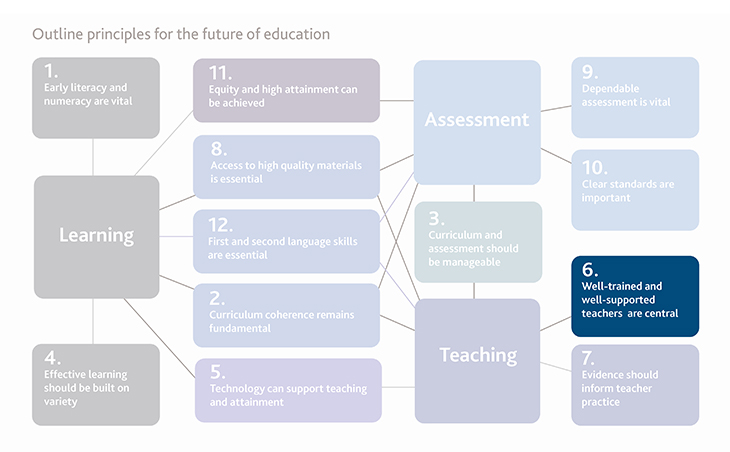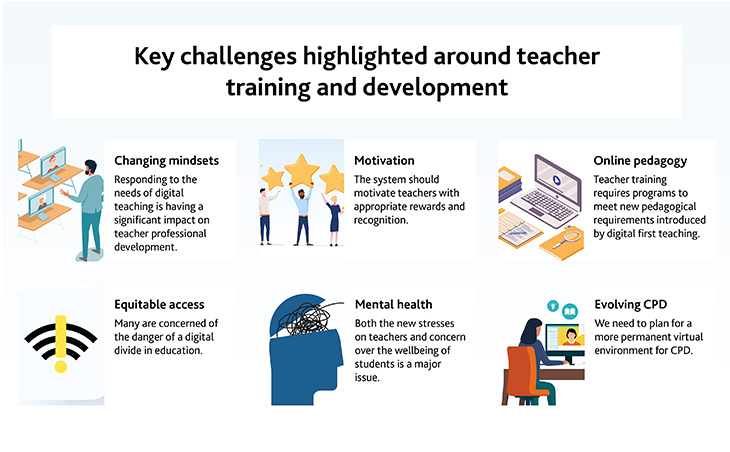Teacher training and development is an integral part of a thriving education ecosystem. However, restrictions during the pandemic put limitations on teacher training just as needs for new skills and support increased, especially in the areas of digital skills and remote teaching.
Teacher quality cannot be considered in isolation. It is critical to the realisation of the wider education system. You can see this in the joined-up picture of education provided by our 12 outline principles for the future of education. The Covid crisis has affected how much of the curriculum can be taught, how the curriculum is taught, what assessments are possible and how coherent education is. All of this requires changes to teaching and the need to support teachers through development and training.

The crisis has affected 63 million teachers around the world. We’ve seen teachers demonstrate innovation and resilience to continue teaching during this time. Now, we need to consider how to shape teacher training and development as an essential part of recovery and progress.
This month, World Bank Group President David Malpass shared that “countries need to accelerate their investment in qualified teachers, providing practical training to improve learning and skills”. This is one of four areas highlighted by the World Bank to boost the return to school and lay foundations for more resilient and more equitable education systems.1
Listening at the national level
Cambridge Partnership for Education joined with Brains Global to reach out to 90 education leaders around the world to explore teacher training and continuous professional development (CPD) in light of the pandemic and recovery. In February, we met for a Global Online Learning Alliance (GOLA) meeting to discuss actions and policies across borders, and to make recommendations for the future where appropriate.
What did education leaders highlight?
Opening remarks covered the importance of motivation, the growing role of parents, responding to teachers needs and committing to online training.
"There are no universal answers but by focussing on key issues of collaboration, accreditation, incentivisation, career progression and adapting pedagogies to the virtual learning environment can all form the basis for national ministry of education policy making." – Former UK Secretary of State for Education, Rt Hon Charles Clarke, in opening remarks.
All 90 education leaders added to these themes in breakout groups. Leaders celebrated countless success stories of teachers adapting innovatively to new pressures and highlighted the sharp increase in collaboration. They also focused on the key challenges of changing mindsets, motivation, online pedagogy, evolving CPD, equitable access and mental health. A full summary of the discussion is available on the Cambridge Partnership for Education website.

Closing discussion between Professor Colleen McLaughlin, Director of Education Innovation: Faculty of Education, and Jane Mann, Managing Director, Cambridge Partnership for Education, stressed the importance of embracing the lessons learned during Covid. “There is a real desire amongst everyone in education to take the experiences of the last year and move forward with genuine reform, adaptation, and continuing improvement. Teacher training and continuous professional development should be at the forefront of such an evolution.”2 Cambridge Partnership for Education shares this goal, and is equipped to support schools, colleges and other centres to prioritise teacher training and CPD in education recovery and beyond.
Cambridge Partnership for Education is part of the University of Cambridge. We partner with governments and organisations to develop education systems from every angle. In the wake of Covid, our priority is not only to support recovery in the short term, but to position education systems to better deal with challenges in the future too. A full report of the GOLA discussion can be found on the Partnership's website.